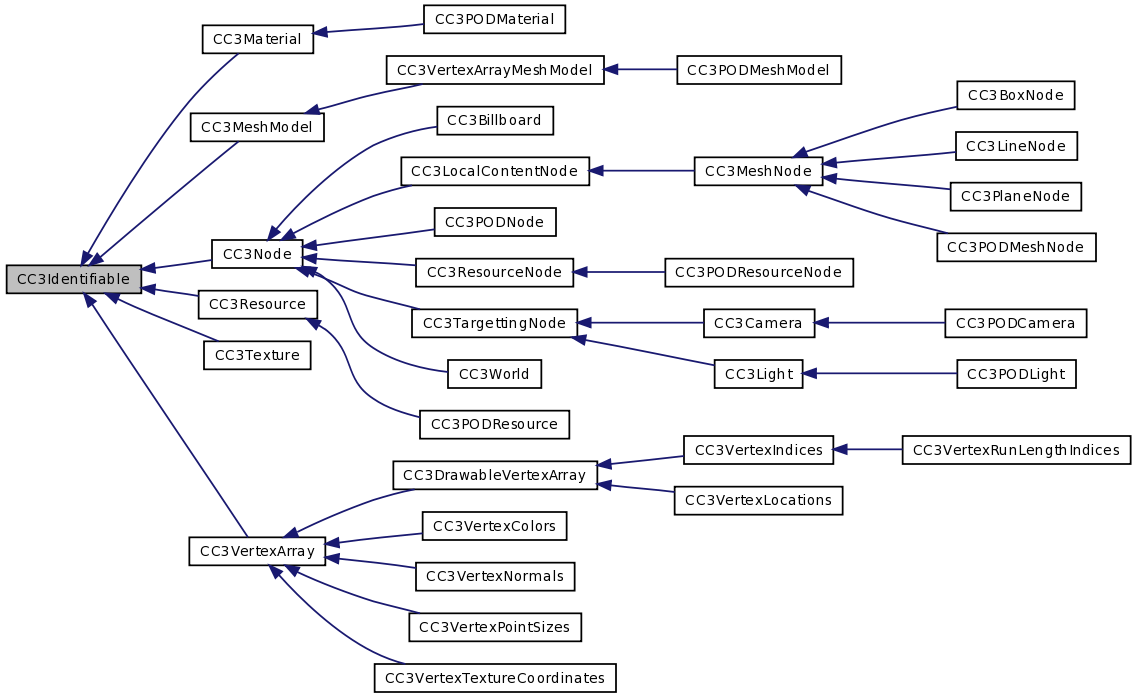This is a base subclass for any class that uses tags or names to identify individual instances. More...
#import <CC3Identifiable.h>

Public Member Functions | |
| (id) | - copy |
| (id) | - copyWithName: |
| (id) | - copyWithZone:withName: |
| (NSString *) | - fullDescription |
| (id) | - init |
| (id) | - initAtIndex:fromPODResource: |
| (id) | - initWithName: |
| (id) | - initWithTag: |
| (id) | - initWithTag:withName: |
| (GLuint) | - nextTag |
Static Public Member Functions | |
| (GLint) | + instanceCount |
| (void) | + resetTagAllocation |
Properties | |
| NSString * | name |
| int | podIndex |
| GLuint | tag |
Detailed Description
This is a base subclass for any class that uses tags or names to identify individual instances.
Instances can be initialized with either or both a tag and a name. Instances initialized without an explcit tag will have a unique tag automatically generated and assigned.
When overriding initialization, subclasses typically need only override the most generic initializer, initWithTag:withName:.
Member Function Documentation
| - (id) copy |
Returns a newly allocated (retained) copy of this instance.
The new copy will have the same name as this instance, but will have a unique tag.
This method may often be used to duplicate an instance many times, to create large number of similar instances to populate a game. To help you verify that you are correctly releasing and deallocating all these copies, you can use the instanceCount class method to get a current count of the total number of instances of all subclasses of CC3Identifiable,
Implemented in CC3Node.
| - (id) copyWithName: | (NSString *) | aName |
Returns a newly allocated (retained) copy of this instance.
The new copy will have its name set to the specified name, and will have a unique tag.
Implemented in CC3Node.
| - (id) copyWithZone: | (NSZone *) | zone | |
| withName: | (NSString *) | aName | |
Returns a newly allocated (retained) copy of this instance.
The new copy will have its name set to the specified name, and will have a unique tag.
| - (NSString*) fullDescription |
Returns a string containing a more complete description of this object.
This implementation simply invokes the description method. Subclasses with more substantial content can override to provide much more information.
| - (id) init |
Initializes this unnamed instance with an automatically generated unique tag value.
The tag value will be generated automatically via the method nextTag.
| - (id) initAtIndex: | (int) | aPODIndex | |
| fromPODResource: | (CC3PODResource *) | aPODRez | |
Initializes this instance from the data of this type at the specified index within the specified POD resource.
| - (id) initWithName: | (NSString *) | aName |
Initializes this instance with the specified name and an automatically generated unique tag value.
The tag value will be generated automatically via the method nextTag.
| - (id) initWithTag: | (GLuint) | aTag |
Initializes this unnamed instance with the specified tag.
| - (id) initWithTag: | (GLuint) | aTag | |
| withName: | (NSString *) | aName | |
Initializes this instance with the specified tag and name.
When overriding initialization, subclasses typically need only override this initializer.
| + (GLint) instanceCount |
Indicates the total number of active instances, over all subclasses, that have been allocated and initialized, but not deallocated.
This can be useful when creating hordes of 3D objects, to verify that your application is properly deallocating them again when you are done with them.
| - (GLuint) nextTag |
Returns a unique tag value to identify instances.
This value is unique across all instances of all subclasses. The initial value returned will be one, and subsequent calls will increment the value retuned on each call. The starting value can be reset back to one via the resetTagAllocation method.
| + (void) resetTagAllocation |
Resets the allocation of new tags to resume at one again.
Property Documentation
- (NSString *) name [read, write, retain] |
An arbitrary name for this node.
It is not necessary to give all identifiable objects a name, but can be useful for retrieving objects at runtime, and for identifying objects during development. Names need not be unique, are not automatically assigned, and leaving the name as nil is acceptable.
- (int) podIndex [read, write, assign] |
The index of this object in the POD resource data.
This generally means the podIndex'th type of object of the class.
- (GLuint) tag [read, write, assign] |
An arbitrary identification.
Useful for keeping track of instances. Unique tags are not explicitly required, but are highly recommended. In most cases, it is best to just let the tag be assigned automatically by using an initializer that does not explicitly set the tag.
The documentation for this class was generated from the following file:
 1.7.2
1.7.2